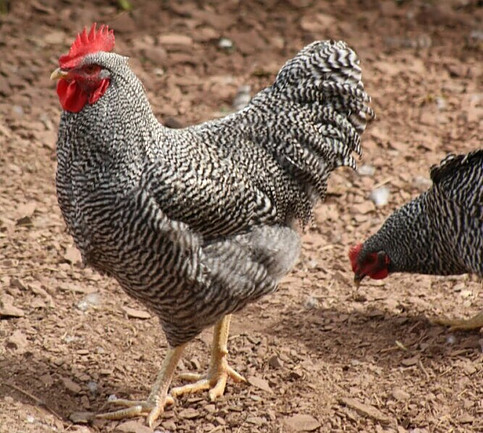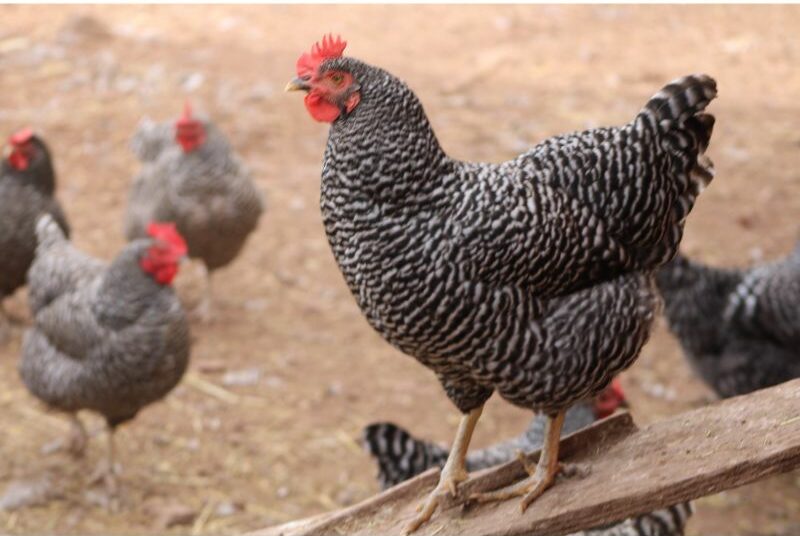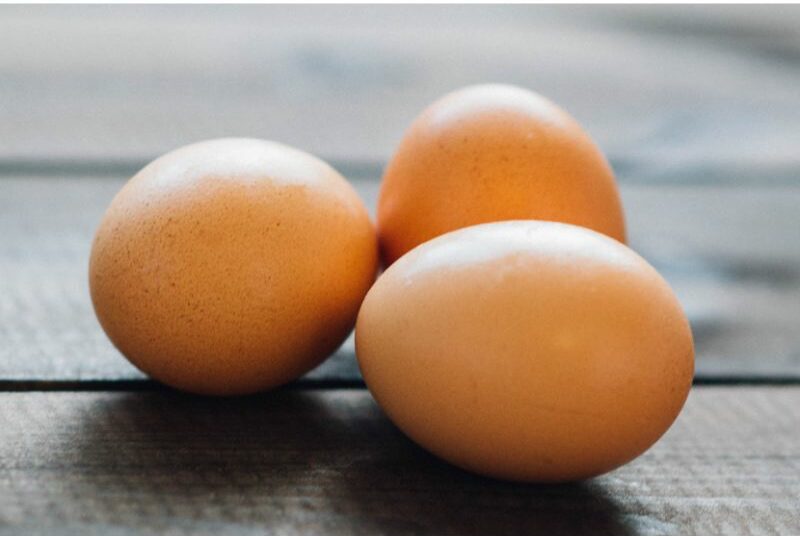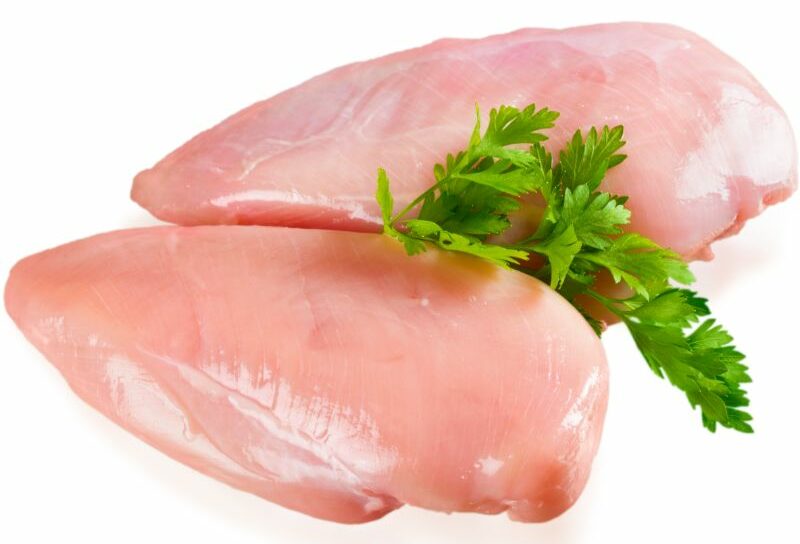
I’m going to introduce you to one of the most recognizable chickens in all of chickendom. The Plymouth Rock. This all-star bird has a combination of traits that make this breed a standout choice for chicken keepers.
This hearty bird is praised for its versatility, which you’re going to find out about as we explore everything Plymouth Rock.
We’ll talk about factors like hardiness, egg production, weight, temperament, and foraging ability. We’ll also touch on whether Plymouth Rock chickens are prone to disease and need any special care.
You’ve come to the right place to learn about a chicken breed that serves many purposes and adapts easily to different climates. Choosing this chicken to add to your flock is choosing a dependable layer, a meat provider, or a bird that can do both.
Next, we will explore the breed’s origin and history to give us more valuable insights into its characteristics. Are you ready? Let’s go.
Plymouth Rock Chickens From Past to Present
I’m going to take you back in time to where it all began. The Plymouth Rock chicken is a plucky survivor with its roots tracing back to the mid-19th century in the United States. Rumor has it that it made a grand entrance at a time when poultry was just starting to be standardized.
In America in the 1800s, an era bustling with agricultural innovation, the Plymouth Rock chicken became a symbol of practicality and reliability.
It was recognized for its distinctive barred feathers and quickly rose in popularity among American farmers and backyard poultry keepers.
You’re going to find out that their origin story isn’t just linear. There’s a bit of mystery swirling around their exact ancestry. Some accounts suggest that the breed was developed by crossing Dominiques and Black Javas, offering a combination of solid egg-laying prowess and substantial meat production that was hard to come by at the time.
The breed’s name, ‘Plymouth Rock,’ holds a level of prestige that mirrors its historical significance. It resonates with the sense of heritage and perseverance. This isn’t just a bird; it’s a piece of American history, embodying the traditional ideals of the country’s agricultural past.
The Dual-Purpose Nature of Plymouth Rock Chickens



Why are Plymouth Rock chickens praised for their dual-purpose capabilities? A fascinating blend of productivity and practicality makes these chickens a standout choice.
Plymouth Rocks are no slouch when it comes to egg laying. You’re going to find out that they lay a respectable number of eggs each year. We’re talking about a steady supply of brown eggs, with the hens averaging around 200 eggs annually.
But it’s not just about the eggs; these birds also bring a lot to the table in terms of meat production. Adult hens weigh in at about 7.5 pounds, while roosters tip the scales at around 9.5 pounds.
Their meat is known for its quality and flavor, making them a valuable meat source for small farms and homesteads.
I can’t stress enough how great it is to have a breed that can provide both eggs and meat. This dual-purpose nature means Plymouth Rocks can be the foundation of a self-sustaining home farming operation or a valuable addition to any backyard coop.
Maybe that’s why you always see a few of them in flocks visible to passersby.
The Resilience of Plymouth Rock Chickens
Now, let’s find out why Plymouth Rock chickens are celebrated for their hardiness and adaptability.
These are birds that don’t fuss much about the weather. They generally thrive, whether it’s the crispness of a New England winter or the blaze of a southern summer.
You don’t have to worry too much about the extreme ends of the thermometer. However, while they are cold-hardy, thanks to their dense feathers, excessive heat can be a slight problem, and you’ll want to provide some shade and water to help them stay cool.
This isn’t just about climate resilience; it’s also about their exceptional temperament.
Plymouth Rocks are known for their calm, docile nature, which makes them a favorite among backyard flock owners.
They are sociable with both their human handlers and fellow flock members. This laid-back temperament is ideal, especially if you’re integrating new chickens into an existing flock.
A good forager by nature, the Plymouth Rock chicken can contribute significantly to its own diet if allowed to free-range, seeking out insects, seeds, and greens. Not only does this mean your feed bill might be lower, but their foraging activity also contributes to pest control.
They’re energetic and love to explore, but they’re also perfectly happy spending their time in a well-sized run if free-ranging isn’t an option for you.
Moving into section five’s subject, you might wonder if there’s a catch to all these positives. Well, Plymouth Rock chickens are generally robust and aren’t known for being especially disease-prone. However, like all living creatures, they have their susceptibilities, which is where special care needs come into play.
Adopting preventative healthcare measures can ensure your flock remains healthy and productive.
Caring for Your Plymouth Rock Chickens’ Health

I’m going to wrap up by addressing some common concerns that people have when it comes to the health and well-being of their Plymouth Rock chickens.
These birds are known to be hardy and disease-resistant, which is great news for their keepers. This doesn’t mean they’re invincible, but their resilience is a clear advantage.
Plymouth Rocks are not particularly prone to any avian diseases, so you’re largely spared from the worries that come with more delicate breeds. Still, you should maintain a consistent worming and vaccination schedule to ensure your flock stays in tip-top shape.
When it comes to their care, you’ll find that Plymouth Rock chickens are not high-maintenance.
They’ll need the basics: proper shelter, well-balanced feed, clean water, and regular health checks. Because of their thick feathers, they generally do well in colder climates, but always make sure they have a dry and draft-free coop.
If you want to ensure the longevity and productivity of your Plymouth Rock chickens, pay attention to their diet, particularly calcium supplements for the hens to maintain strong eggshells.
Moreover, since they’re good foragers, allowing them ample space to roam can contribute to a healthier and happier flock.
In my experience, choosing the Plymouth Rock breed can be immensely rewarding. They’re friendly, dependable, and can be a fantastic addition to any homestead. With proper care, your Plymouth Rocks will thrive, providing you with fresh eggs, quality meat, and the simple joys of raising chickens.
Take care.
Dave
Chickenmethod.com
